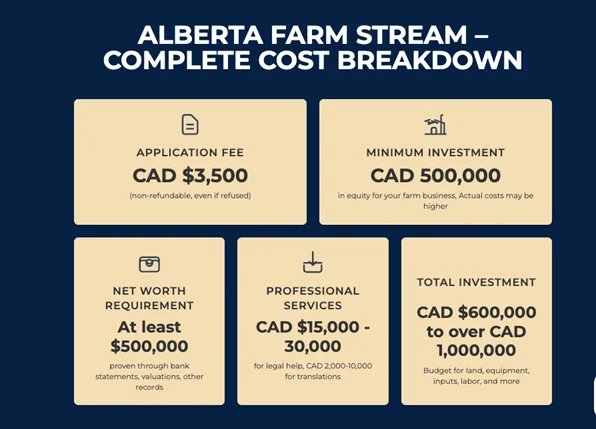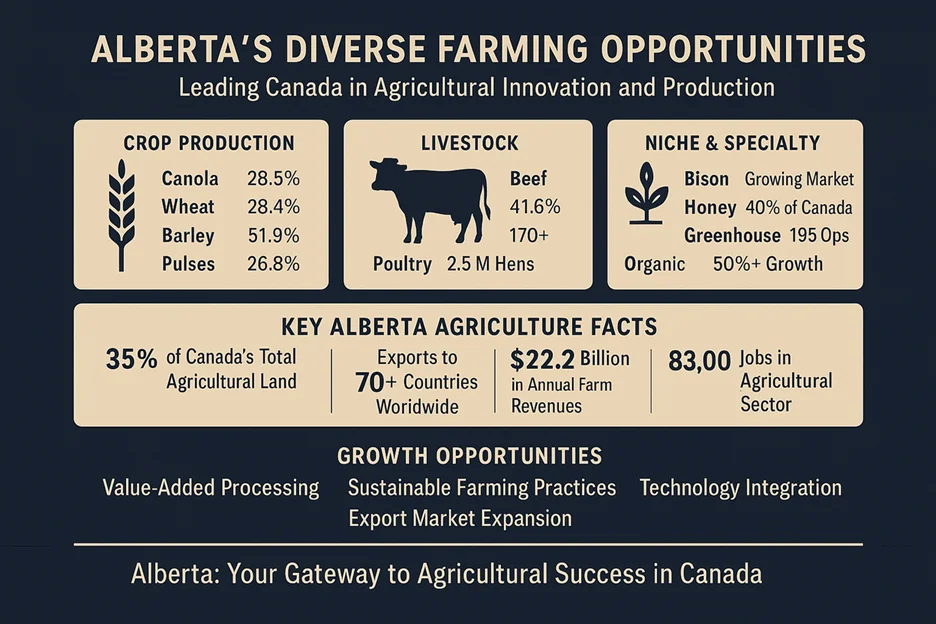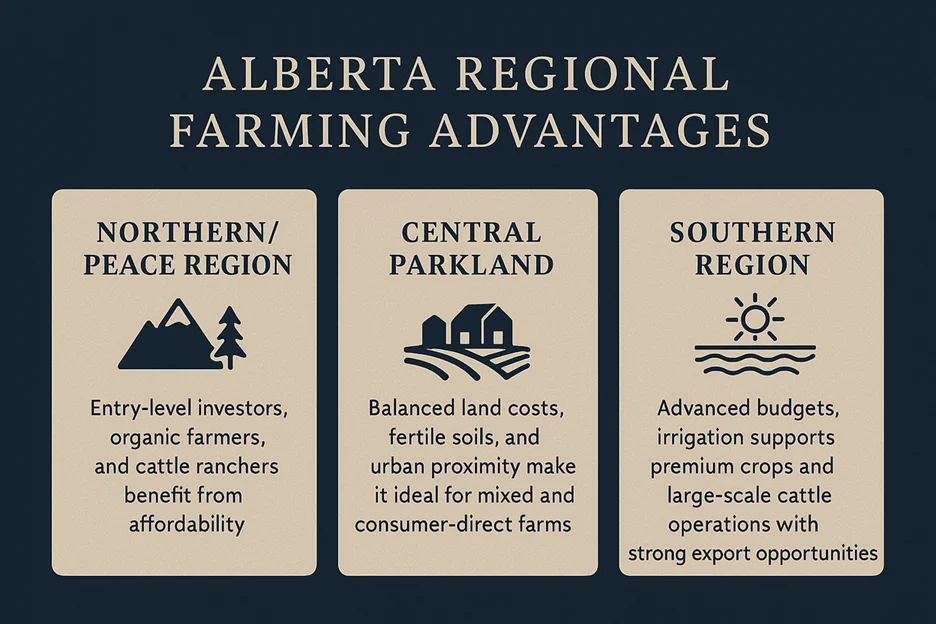Discover how Alberta’s PNP Farm Stream helps experienced farmers immigrate to Canada. Learn about eligibility, costs, farmland prices, and step-by-step application process.
The Alberta PNP Farm Stream represents one of Canada’s most specialized pathways for experienced agricultural entrepreneurs seeking permanent residence.
For entrepreneurs with farming experience, Alberta’s PNP Farm Stream provides a direct route to Canadian permanent residence through agricultural investment and business establishment. This comprehensive guide will walk you through every aspect of the program, from eligibility requirements to potential challenges, helping you make an informed decision about your immigration journey.
The Alberta PNP Farm Stream is designed for individuals who have both experience in managing farms, and financial resources to invest in primary agriculture production.
Unlike general entrepreneur programs that accept a variety of businesses, this stream is exclusively for primary production farms (e.g., crop production, livestock, dairy). It does not cover food processing, equipment sales, or farm supply businesses.
Successful applicants receive a provincial nomination certificate, which significantly increases their chances of securing permanent residence through the federal immigration process.

To qualify for Alberta’s Farm Stream, you need to meet specific criteria that show your readiness to succeed in Alberta’s agriculture. Specifically, you must demonstrate the following:
Here’s what you can expect when applying:
Average processing time: around 4 months for the provincial stage, plus 6–8 months for the permanent residence application stage.
We understand that costs are a big concern, so let’s lay them out clearly. The Farm Stream requires significant investment, but it’s an opportunity to build lasting value.
These figures reflect the commitment needed, but they pave the way for a prosperous future. Our tailored services can help optimize your budget—schedule a consultation to discuss your specific situation.

If Alberta’s Farm Stream is not the right fit, there are other pathways:
Province / Program | Minimum Net Worth | Minimum Investment | Experience Required | Unique Features |
Alberta PNP – Farm Stream | CAD $500,000 | CAD $500,000 (equity) | Farm management experience required | Only 17 nominations annually; limited to primary production farms (no processing or supply businesses) |
Manitoba PNP – Farm Investor Pathway | CAD $500,000 | CAD $300,000 | 3+ years of farm ownership/operation | Lower investment than Alberta; strong agricultural infrastructure |
BC PNP: Entrepreneur (Farm Option) | CAD $600,000 | CAD $200,000 | 3+ years as owner-manager OR 4 years senior management (agriculture preferred) | Requires job creation for 1 Canadian citizen/PR; access to Asian export markets |
New Brunswick PNP – Business Immigration (Farm Option) | CAD $300,000 | CAD $150,000 | 2+ years of farm ownership/management | Easiest entry requirements; hobby/personal farms not eligible |
Key Takeaways
Each program has different strengths, so choosing the right option depends on your capital, farming experience, and long-term goals.
Each program has unique requirements, costs, and timelines. A careful comparison will help you decide which path aligns with your experience and goals.

Farmland prices in Alberta vary greatly by region. On the low end, northern pastureland starts at around CAD $1,500 per acre, while premium irrigated land in the south can exceed CAD $18,000 per acre.
With the Farm Stream’s $500,000 minimum investment, you could buy:
Keep in mind that listed prices often include extras such as residential buildings, water rights, or location premiums that don’t always add to farm productivity.
Farm businesses in Alberta generally fall into three models:

Major Cities: Grande Prairie, Fort McMurray, Peace River
Major Cities: Edmonton, Red Deer, Camrose
Major Cities: Calgary, Lethbridge, Medicine Hat
Running a farm involves significant operating costs:
Profit margins typically range from 15–30% for commodity farms, meaning scale is essential. However, specialty farms and direct-marketing operations can achieve margins 60–80% higher than wholesale commodity sales.
Alberta and Canada provide strong support for sustainable agriculture. Key programs include:
Applicants who align their business plans with sustainability, technology adoption, and value-added farming stand a stronger chance of receiving funding and demonstrating long-term contributions to Alberta’s agriculture.
Want to learn more about farming opportunities in Alberta?
Q: What is the Alberta Farm Stream program?
A: The Alberta Advantage Immigration Program (AAIP) Farm Stream is a provincial immigration pathway for experienced farmers seeking Canadian permanent residence through agricultural business investment in Alberta.
Q: How much do I need to invest in the Alberta Farm Stream?
A: You must invest a minimum of CAD $500,000 in equity in a primary production farming business and demonstrate a net worth of at least CAD $500,000.
Q: What is the application fee for Alberta Farm Stream?
A: The non-refundable application fee is CAD $3,500.
Q: How long does Alberta Farm Stream processing take?
A: Processing averages up to 4 months for both expression of interest and business application assessment, though times may vary based on application complexity.
Q: Do I need farming experience for Alberta Farm Stream?
A: Yes, you must prove farm management skills through financial documentation of existing farm businesses, agricultural education credentials, training records, or work experience in farm management.
Q: What types of farming qualify for Alberta Farm Stream?
A: Only primary production agriculture qualifies, including crop production, livestock operations, dairy farming, and specialty crops. Food processing, equipment sales, and farm supply businesses are excluded.
Q: Can I buy an existing farm instead of starting new operations?
A: Yes, the program allows purchase of existing Alberta farms. This may offer advantages like established infrastructure and market relationships while still meeting investment requirements.
Q: Is there a language requirement for Alberta Farm Stream?
A: While not explicitly stated, applicants must demonstrate effective English or French communication abilities to manage farming operations and integrate into Canadian society.
Q: What types of farms can I buy or invest in Alberta?
A: Alberta offers diverse farming opportunities including grain and oilseed operations (wheat, canola, barley), cattle ranches (cow-calf or feedlot operations), pulse crops (peas, lentils, chickpeas), specialty crops (organic vegetables, berries), greenhouse operations, and mixed farming enterprises combining crops and livestock.
Q: What crops grow well in Alberta?
A: Alberta is a major producer of wheat (9.9 million tonnes annually), canola (5.09 million tonnes), barley (4.2 million tonnes producing 51.9% of Canada’s supply), field peas, lentils, chickpeas, and specialty crops. The province also supports sugar beets (only domestic source in Canada), honey production (40% of national total), and various berries including saskatoons and haskaps.
Q: Can I buy a farm for $500,000 in Alberta?
A: The $500,000 minimum investment requirement can purchase different amounts depending on region and land type. In northern regions, this could buy 200+ acres of pastureland ($1,500-2,100/acre) or 100-160 acres of cultivated land ($3,100-4,700/acre). However, in southern irrigated areas ($18,000/acre), it would only purchase 25-30 acres. Most viable operations require additional investment beyond the minimum.
Q: How much do farmers earn in Alberta?
A: Farm income varies significantly by operation size and type. Alberta’s provincial net farm income was $2.7 billion in 2024. Large farms ($2M+ revenue) representing 4% of operations generate 61.7% of provincial farm revenues. Grain operations typically achieve 15-30% profit margins, while specialty operations like organic farming can generate $40,000-100,000 per acre. Average Canadian farm Net Operating Income is forecasted at $109,000 for 2025.
Q: Where in Alberta should I look for a farm?
A: Location depends on your farming goals: Southern Alberta (irrigated areas) for high-value crops like sugar beets, chickpeas, and intensive vegetable production; Central Parkland for versatile grain/livestock operations and direct-to-consumer businesses near Edmonton/Calgary; Northern/Peace regions for affordable land, organic farming clusters, and cold-hardy crops. Each region has distinct soil types, climate conditions, and land costs.
Q: Can I get funding to buy a farm in Alberta?
A: Yes, multiple funding sources exist. AFSC offers Next Generation Loans for new farmers and Developing Producer Loans with competitive fixed rates (lending limit up to $30 million). Commercial banks like ATB Financial provide specialized agricultural financing. Government grants include the On-Farm Climate Action Fund (up to $75,000), On-Farm Value-Added Program (up to $250,000), and On-Farm Efficiency Program (up to $150,000) for qualifying projects.
Q: What business plan requirements exist for Alberta Farm Stream?
A: You need a comprehensive business plan demonstrating detailed knowledge of Alberta’s agricultural conditions, market dynamics, and alignment with provincial agri-food targets, reviewed by Alberta Agriculture and Irrigation.
Q: Do I need Canadian bank financing for Alberta Farm Stream?
A: Yes, you must provide proof that a Canadian financial institution is willing to finance your proposed farming business, which can be challenging for international applicants.
Q: What are the total costs for Alberta Farm Stream immigration?
A: Total costs typically range from CAD $600,000 to over $1,000,000, including the minimum investment, application fees, professional services, and operational expenses.
Q: What are typical operational costs for Alberta farms?
A: Large grain operations cost $200-600 per acre annually (inputs, equipment, labor). Cattle operations require $800-1,200 per head for feed costs alone. Intensive operations like greenhouses can cost $5,000-15,000 per acre with labor representing 40-60% of production costs. Land ownership costs include taxes, insurance ($20-80 per acre), plus equipment maintenance and depreciation.
Q: Which regions offer the best value for farm investment?
A: Northern and Peace regions show highest price appreciation (10.5-11.2% in 2024) with lowest absolute costs, offering potential capital appreciation. Central Parkland provides balanced productivity and urban market access. Southern irrigated land commands premium prices ($18,000/acre) but enables highest-value crop production and intensive operations.
Q: What happens after Alberta Farm Stream approval?
A: You receive a provincial nomination certificate and must apply to the federal government for permanent residence, which takes an additional 6-8 months with medical and security checks.
Q: Can my family immigrate through Alberta Farm Stream?
A: Yes, successful applicants can include spouses and dependent children, who must meet standard immigration requirements including medical examinations and security clearances.
Q: What if my Alberta Farm Stream application is rejected?
A: The CAD $3,500 fee is non-refundable. While a reconsideration process exists, success rates for overturning initial rejections are generally low.
Q: Are there work permits available during Alberta Farm Stream processing?
A: The application process doesn’t automatically provide work authorization. You must apply separately for appropriate work permits if you wish to work in Canada during processing.
Q: How does Alberta Farm Stream compare to other provincial farm programs?
A: Alberta requires the highest investment ($500K minimum) and net worth ($500K) but offers only 17 nominations annually. Manitoba requires the same net worth ($500K) but lower investment ($300K) with 3 years farm experience required. BC requires higher net worth ($600K) but lower investment ($200K). New Brunswick has the lowest requirements ($300K net worth, $150K investment) with only 2 years farm experience needed.
Q: What is the Manitoba Farm Investor Pathway?
A: This program requires at least 3 years of farm ownership/operation experience, language proficiency in English or French, minimum net worth of $500,000 CAD, and commitment to invest minimum $300,000 CAD in a Manitoba farming business. It offers lower investment requirements than Alberta but similar experience requirements.
Q: How does BC PNP Entrepreneur Immigration work for farmers?
A: BC requires minimum investment of $200,000 in a commercially viable farm (not hobby farms), creation of at least one full-time job for a Canadian citizen/permanent resident, minimum personal net worth of $600,000, and at least 3 years of business owner-manager experience or 4 years as senior manager (preferably in agriculture).
Q: What about New Brunswick’s Business Immigration Stream for farmers?
A: New Brunswick requires the lowest financial thresholds: personal net worth of $300,000 and minimum investment of $150,000 into a farm. Applicants need at least 2 years of farm ownership or management experience. Hobby farms or personal consumption farms are not eligible.
Q: Which provincial program for farmers should I choose?
A: Choose based on your financial capacity and experience: Alberta for those with highest investment capacity ($500K+) and access to diverse agricultural opportunities; Manitoba for balanced requirements with established agricultural infrastructure; BC for higher net worth holders seeking lower investment thresholds and proximity to Asian markets; New Brunswick for those with limited capital seeking the most accessible entry requirements.
Ready to explore your Alberta Farm Stream options? At Sobirovs Law Firm, we provide expert guidance on agricultural immigration pathways and help you develop competitive applications that meet Alberta’s demanding requirements. Contact our experienced team for a personalized consultation on your Canadian immigration journey.
Disclaimer: Information is for general guidance only, may change without notice, and does not constitute legal advice.
Your AI Immigration Assistant
👋 I'm here to help you explore Canadian business immigration options — specifically for investors, entrepreneurs, and business owners.
How it works: We'll chat for up to 60 minutes. I'll ask a few questions, suggest immigration pathways, and answer yours. I’ll notify you when 15 minutes remain.
📌 What I Can (and Can't) Do:
